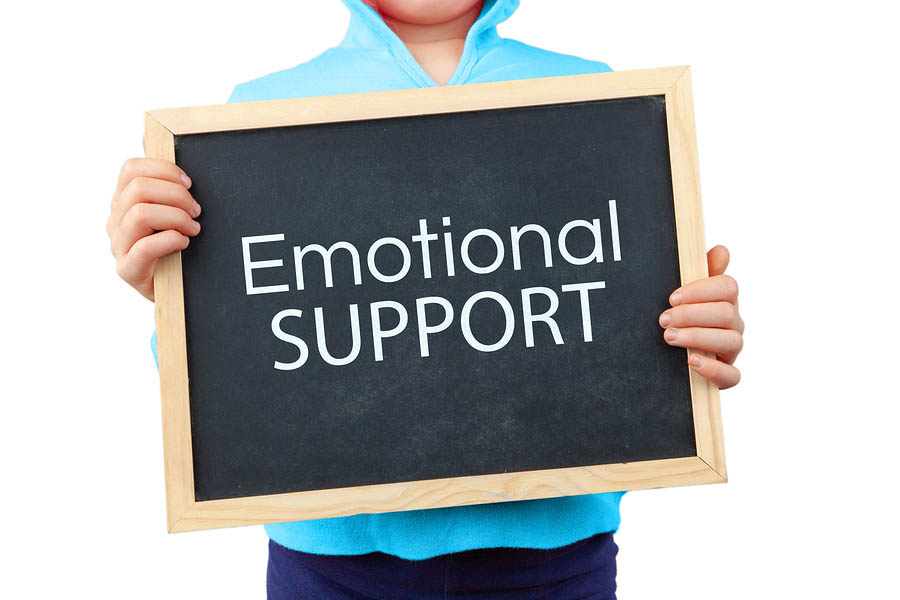We all need emotional support from time to time. Whether we’re going through a tough breakup, dealing with the death of a loved one, or struggling with a mental health disorder, it’s important to have someone to talk to who will understand what we’re going through. For some people, this means talking to friends and family members. But for others, it might mean seeking out professional help. In this blog post, we’ll discuss the benefits of emotional support and how to get it.
Contents
What Is Emotional Support?
 Emotional support is the process of providing others with comfort and encouragement. It’s a way of communicating caring, acceptance, and understanding to people who are experiencing difficult times or major life changes.
Emotional support is the process of providing others with comfort and encouragement. It’s a way of communicating caring, acceptance, and understanding to people who are experiencing difficult times or major life changes.
This type of support can be essential to someone’s wellbeing, and it can help them through challenging periods.
Sometimes, people are hesitant to ask for emotional support because they don’t know how, or they want to avoid burdening others with their troubles.
But not asking for help can be harmful. Refusing to turn to other people when you need them most may lead to depression and anxiety, as well as isolation from your loved ones.
Emotional support can come from a variety of sources, including friends, family members, therapists, and support groups.
Different People Who Can Provide Emotional Support

There are many different types of emotional support, and it may be provided by a variety of people in varying ways. The following are examples:
Family Members
A family member is someone biologically related to you, but more importantly, is someone who cares about you and wants to see you succeed. Parents, siblings, grandparents, uncles/aunts, and cousins are all considered members of your extended family that can offer love and encouragement when needed.
Even if your relationship with these people isn’t always ideal or perfect (no one’s ever is), they have the ability to make life easier for you when they provide emotional support in times of need. This type of emotional backing comes from knowing others care deeply about what happens both now as well as into the future; it’s a sense of security and assurance that can be incredibly helpful.
Friends
Your friends are another important group to have in your life when it comes to emotional support. Friends come in all shapes and sizes, but the key thing they share is that you feel comfortable being yourself around them. They know your quirks and they love you anyway; this type of acceptance is essential for gaining the trust needed for opening up about difficult topics or seeking advice.
Having a friend who listens without judgment (and sometimes just with a hug) can make all the difference during tough times. These people offer impartiality, understanding, and comfort – something everyone needs every now and then.
Professional Help
There will undoubtedly be times in your life when you don’t want to burden friends or family with your concerns, and/or you need outside assistance from a trained health professional.
Therapists are great for helping people deal with anxiety, depression, stress management, life transitions (such as marriage or divorce), and other challenges of daily living. There is nothing wrong with reaching out for help when you need it; in fact, doing so can be incredibly healthy! And there will always be people who care about you enough to listen and understand what you are going through – even if they cannot fix the situation themselves.
Signs That You Need Emotional Support

There are many signs that you need emotional support, including:
Feeling Isolated
Sometimes there are times when you feel isolated and alone. Other times, it feels like people are around but they just don’t understand what you’re going through. This is a sign that you need emotional support – someone to be there for you, who can relate to your feelings. It might not even be the same situation because we all experience life differently; however, they can at least empathize with how you feel inside and show their support in any way possible.
Feeling Hopeless
When you feel like there’s no point in anything and that things will never change, it can be a sign that you need emotional support. This is because it feels as though nobody understands what you’re going through or even worse, they do understand but don’t care. It also feels like you’re the only one going through this and that can be very lonely.
Having Trouble Sleeping
Insomnia or trouble sleeping is often a sign of an underlying problem, such as depression or anxiety. If you find yourself struggling to sleep at night and it’s been going on for more than two weeks, then it might be time to seek out emotional support.
Experiencing Flashbacks
If there are certain things that trigger memories from your past – whether they happened recently or long ago – and cause intense emotions, then it’s a sign that you need emotional support. This is because those memories can feel like they’re happening all over again and it feels like you can’t escape
Having Trouble Sleeping
If you’re experiencing flashbacks, it could be due to trauma you experienced in the past. If so, then seeking out emotional support may help with those memories and allow you to move forward from them.
Feeling Anxious or Nervous All Time
If you are feeling anxious or nervous all of the time, it might be a sign that something else is going on such as depression. There is no shame in asking for help when things seem overwhelming because sometimes life can feel like too much at times! And don’t let anyone tell otherwise. Sometimes, all we need is a little help to get through tough times.
Having Physical Ailments
If you’re experiencing physical ailments such as headaches, stomach aches, chest pain, or other issues but don’t have any sort of physical explanation for it, then it might be time to seek out emotional support. This is because oftentimes our body reacts to the stress we’re feeling emotionally by manifesting in physical ways. IT can be helpful to have someone to talk to about what you’re going through who will understand and not judge.
Reasons Why You Need Emotional Support

There are many reasons why it is important to get emotional support. Reasons are:
Trauma
Sometimes people go through traumatic experiences that can leave them feeling scared, alone, and unworthy. This can be especially hard to cope with if the person doesn’t have anyone to talk to about it. Sometimes it is helpful to talk to a professional who can help you work through your feelings.
Anxiety
Sometimes people get anxious or panicky and this can lead to feeling depressed and scared. This is called anxiety depression. There are different types of anxiety disorders. It can be very helpful to talk to someone who understands what you are going through.
Loneliness
Sometimes people feel lonely and this can make them feel sad and scared. It is important to have people in your life that you can rely on for support. Friends and family are great sources of emotional support.
Death of Loved One
When someone loses a loved one, it can be really hard to cope with the death. Grieving is a natural process that everyone goes through when they lose someone close to them. It is important to allow yourself time to grieve and seek out emotional support if needed. There are many groups out there that offer support for those grieving the loss of a loved one. It can be really helpful to talk to someone who has been through a similar experience.
Panic Attacks
Sometimes people get panic attacks and this can be very scary. It is helpful to talk with someone who understands what you are going through and can help you manage your symptoms. There are many things that can trigger a panic attack including certain foods, smells, situations like flying in an airplane or being in crowded places.
How To Give Emotional Support?

There are many ways in which a person can give emotional support. Some of these are:
Talking To Person
Sometimes, the best way to provide emotional support is by talking to the person who needs it. Just being there and listening can make a big difference. It also allows the person to express their feelings and thoughts, which can be very helpful. Giving it a try can make a big difference in somebody’s life. Sometimes there are no words to say, you can just be there for that person.
Giving Hug
Sometimes a simple hug can make everything better. This is especially true if the other person is going through something difficult and upsetting. Sometimes it’s good just to let them know that someone cares about them enough to give them a hug when they need it most. If the situation permits, then this might even be able to stop an argument before it starts! It never hurts anyone except maybe their ego but sometimes even those don’t matter much at all anymore anyway these days anyway.
Trying To Understand
Trying to understand another person’s emotions and feelings can be very helpful. Understanding where they are coming from will allow you to better support them emotionally during their time of need. You can ask questions that help you get an idea of what they’ve been through or how they’re feeling right now so that when it comes down to giving advice, it’ll be more specific than just saying “that sucks.” It also makes for a deeper connection between yourself as well… The other person might not always agree with everything you say, but there’s nothing wrong with trying things out before deciding whether or not something works best in your situation.
Giving Time To People Who Need It Most
Sometimes the most important thing is just being there when someone needs it most. If someone has had a bad day or week, they may need some time to themselves. You can offer them this by offering some quiet space where they can relax and regroup for whatever comes next in life after such an experience happens too often unfortunately these days anyway.
Offering Helping Hand
Sometimes it’s hard enough just getting out of bed every morning let alone doing all those “little things” that pile up over time like cooking meals from scratch daily or cleaning housework etcetera so sometimes lending an extra hand with these tasks might seem insignificant when compared against bigger problems but could actually make a big difference if done consistently on regular basis as needed appropriate times too.
Taking Break
Sometimes the best thing you can do is take a break. It’s not always easy to be there when someone needs it most, but taking some time away from each other can help both parties regroup and refocus on what matters in life right now today still yet again as well too next later soon afterward etcetera more so even at all anyway perhaps surely likely hopefully eventually possibly probably maybe potentially presumably conceivably plausibly perhaps conceivably.
Working Together As Team
This is especially true for couples who have been together a long time or families living under one roof with young children running around incessantly throughout their daily lives: working together as a team will make home life much easier because everyone knows exactly where they stand and what responsibilities are expected of them. This can prevent a lot of arguments and stress from happening in the first place, which is always a good thing.
Taking Care Of Yourself
This one is especially important. If you’re not taking care of yourself, then you won’t be able to take care of anyone else properly. Make sure to get plenty of rest, eat healthy foods, and exercise regularly so that you’re in the best possible shape to take on whatever life throws your way. You’ll thank yourself later. Sometimes all we need is a hug to make us feel better. Emotional support can be very helpful during difficult times. It’s important to understand where the other person is coming from and offer them advice that is specific to their situation.
Showing Up Whenever Someone Need
Sometimes the best thing you can do is just show up. If someone has had a bad day, they may need some time to themselves. You can offer them this by being there for them when they need it most. This could mean lending an ear, giving them some space, or helping out with household tasks. Taking care of yourself is important, but so is taking care of others. Make sure to be there for the people who need you most. It also makes for a deeper connection between yourself as well. The other person might not always agree with everything you say, but there’s nothing wrong with trying things out before deciding whether or not something works best in your situation.
Conclusion
Emotional support does more than just make you feel better about yourself. Sometimes, you need that extra support to get where you want to be. This is a good thing because it gives more power and strength to your character. It also provides an opportunity for people with mental health issues to seek help from other people who may have the same problems as them.
It’s important not only for yourself but also for others around you. Your friends or family members can provide emotional support by listening, offering advice, or helping you cope with difficult situations in life such as loss of employment, divorce, or even death of a loved one. You may find that having someone there when things are tough will make all the difference between getting through these hard times together rather than alone! So don’t hesitate; if ____ then why not get emotional support?
A Word From Therapy Mantra
Your mental health — Your psychological, emotional, and social well-being — has an impact on every aspect of your life. Positive mental health essentially allows you to effectively deal with life’s everyday challenges.
At TherapyMantra, we have a team of therapists who provide affordable online therapy to assist you with issues such as depression, anxiety, stress, workplace Issues, addiction, relationship, OCD, LGBTQ, and PTSD. You can book a free therapy or download our free Android or iOS app.


